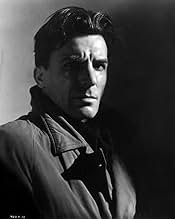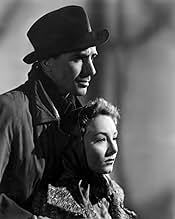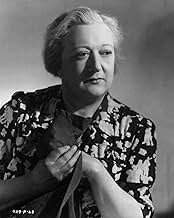अपनी भाषा में प्लॉट जोड़ेंA train disaster is told as four short stories to give character studies of the people involved, how it will affect them, and how they deal with it.A train disaster is told as four short stories to give character studies of the people involved, how it will affect them, and how they deal with it.A train disaster is told as four short stories to give character studies of the people involved, how it will affect them, and how they deal with it.
Patric Doonan
- Ron Stacey (segment "The Engine Driver")
- (as Patrick Doonan/Patric Doonan)
फ़ीचर्ड समीक्षाएं
Compenium films such as these were very popular in the late forties.Naturally their success rides and falls on the quality of the story.Alas in this case only one of the stories is worth telling.The Valerie Hobson/John Clements story is truly awful.Jack Warners domestic problems seem more like an episode of the Huggetts.The ex German POW story has some promise but becomes repetitive.The Peter Finch/Mary Morris story is quite good but is undermined by the somewhat ridiculous proposition that a murderer would cart the dead body of his wife around in a theatrical basket.The fact that there is a good cast,and a strong band of writers and directors make it all the more disappointing.The most interesting aspect of the film is the considerable location work,which includes a view of the late lamented Euston arch.
'Train of Events' was a critical and commercial failure in its time but if you like these British films as much as I do I think you'll find plenty to enjoy here.
'Compendium' films were popular in the late Forties, several were made from the short stories of Somerset Maugham and then there was the greatest of them all 'Dead of Night'. 'Train of Events ', hardly in that class, contains four stories which all culminate on a train which we saw crashing in the opening scenes. So, like 'Friday the Thirteenth' ( a great portmanteau movie made in 1933) the climax is a matter of virtue rewarded and villainy punished as not everyone survives.
Interestingly television is quite strongly featured for the time (1949), a wind-up gramophone looks much more appropriate!
Valerie Hobson is first actor credited though her role is no larger than several others, she plays the forgiving wife of a philandering husband. In real life Hobson was married to British cabinet minister John Profumo whose relationship with Christine Keeler brought down a government in the sixties. Once again Life Imitates Art. In another story Peter Finch murders his faithless wife. He spouts chunks of Shakespeare, looked gaunt and middle-aged to me.
The model-work at the climax is satisfyingly convincing, I recommend 'Train of Events'
'Compendium' films were popular in the late Forties, several were made from the short stories of Somerset Maugham and then there was the greatest of them all 'Dead of Night'. 'Train of Events ', hardly in that class, contains four stories which all culminate on a train which we saw crashing in the opening scenes. So, like 'Friday the Thirteenth' ( a great portmanteau movie made in 1933) the climax is a matter of virtue rewarded and villainy punished as not everyone survives.
Interestingly television is quite strongly featured for the time (1949), a wind-up gramophone looks much more appropriate!
Valerie Hobson is first actor credited though her role is no larger than several others, she plays the forgiving wife of a philandering husband. In real life Hobson was married to British cabinet minister John Profumo whose relationship with Christine Keeler brought down a government in the sixties. Once again Life Imitates Art. In another story Peter Finch murders his faithless wife. He spouts chunks of Shakespeare, looked gaunt and middle-aged to me.
The model-work at the climax is satisfyingly convincing, I recommend 'Train of Events'
This curiously little known film commands your attention from the very beginning - with what must be one of the best opening sequences ever committed to film - a startling ultra-serious train wreck looming forward - but we don't see the outcome till the finish of the story. The story, or actually stories, take the form of introducing us to four of the doomed train's passengers from 3 days before the incident. Four British directors each take a turn at 'telling' each passengers tale - up to the aftermath. For some, this technique might give the movie an episodic feel, as each presents in their own style but most won't even be aware of this. Generally, it's an interesting movie even if certain elements might now look somewhat dated but this of course will be personal to each viewer.
Two major award-winning Cinematographers Paul Beeson, and Gordon Dines, share the job of capturing the events as they unfold - all on nice b/w film stock. The film has been given a quite lavish re-mastering and the Ealing Studios DVD offers clean images and good sound. As might be expected from Ealing, there are scatterings of humor throughout the dramatic journey. Train enthusiasts will be enthralled at seeing the range of engines and rolling stock of the day being paraded - including LMS Royal Scott Class No. 46126. For any who enjoy British 40-50s movies, this could well suit you and Aussie Peter Finch appears in a major early role.
Two major award-winning Cinematographers Paul Beeson, and Gordon Dines, share the job of capturing the events as they unfold - all on nice b/w film stock. The film has been given a quite lavish re-mastering and the Ealing Studios DVD offers clean images and good sound. As might be expected from Ealing, there are scatterings of humor throughout the dramatic journey. Train enthusiasts will be enthralled at seeing the range of engines and rolling stock of the day being paraded - including LMS Royal Scott Class No. 46126. For any who enjoy British 40-50s movies, this could well suit you and Aussie Peter Finch appears in a major early role.
10clanciai
This is so much better than all the mass of train thrilers, all excellent and outstanding in suspense, while this one is no thriller but all perfectly natural, telling the stories of very ordinary people om board a train heading for disaster. The character you will remember best and forever is probably Peter Finch in his first film role as a Shakespeare actor in a truly tragic part, having lost his life and soul in six years of war and being constantly betrayed by his wife. His story is a drama in itself, while the other three destinies that are being followed are easier to digest, the story of the train driver, the story of a conceited conductor, his piano soloist and his wife, and the story of a German refugee, still suffering from the traumas of his past. Above all, the story is ingeniously conceived, weaving together four very different destinies, totally different from each other, none knowing anything about the others, and there are som police investigators as well, headed by Michael Hordern. There are so many dimensions to this film, the concert hall, the Shakespeare theatre, the domestic circumstances of the train driver and his family and friends, and the desperate circumstances of the refugee and his self-sacrficing girl getting their hardship exacerbated by a ruthless callous landlady. It's a pearl of cinematic invention, and the music adds to genuine quality as well. This is a film to enjoy and admire - and to have your compassion boosted with.
This is a not very widely known portmanteau film from 1949, in which four disparate stories are told, each culminating in the protagonists boarding a train to Liverpool, their stories becoming ever more enmeshed, only this train is headed for disaster.
I largely agree with Robert Temple's review (although there are spoilers and it is John Clements who plays the composer, not Gregson).
In contrast to many of the other reviews I found something rather good in all four stories, be it drama, witty dialogue, or humour. I thought it was all rather well done actually. For me, the standout performance was probably that of Peter Finch, who looked gaunt and utterly riven throughout.
In addition to the intriguing structure of the film -which has surely acted as an example to later directors- this film has interest today because it shows many street scenes in London and various scenes shot on the railways; who would have thought the age of steam would be over about fifteen years after this?
Anyway whilst some of the facets of this film will be lost on some folk, overall I thought it a pretty good effort, deserving to be better known and more widely appreciated than it is. Eight out of ten from me.
I largely agree with Robert Temple's review (although there are spoilers and it is John Clements who plays the composer, not Gregson).
In contrast to many of the other reviews I found something rather good in all four stories, be it drama, witty dialogue, or humour. I thought it was all rather well done actually. For me, the standout performance was probably that of Peter Finch, who looked gaunt and utterly riven throughout.
In addition to the intriguing structure of the film -which has surely acted as an example to later directors- this film has interest today because it shows many street scenes in London and various scenes shot on the railways; who would have thought the age of steam would be over about fifteen years after this?
Anyway whilst some of the facets of this film will be lost on some folk, overall I thought it a pretty good effort, deserving to be better known and more widely appreciated than it is. Eight out of ten from me.
क्या आपको पता है
- ट्रिवियाPeter Finch and Laurence Payne received "and introducing" credits.
- गूफ़Within the first minute and a half of the film the locomotive pulling the Euston to Liverpool express varies several times in cut shots from the largest 4-6-2 "Duchess" express locomotive to a variety of different, smaller 4-6-0 locomotives, variously with or without smoke deflectors, with single or double chimneys, with tapered or parallel boilers and with different numbers and tender insignias ("British Railways" or "LMS"). At one point a "Duchess" is seen again. Locomotive classes seen pulling the same train without it stopping thus include "Duchess", "Jubilee", "Patriot" and "Royal Scot".
- भाव
Doris Hardcastle (segment "The Engine Driver"): Oh, it's you...
Ron Stacey (segment "The Engine Driver"): Well, don't overwhelm me ducks. I dunno as my poor old ticker'll stand it.
- कनेक्शनFeatured in Remembering John Gregson (2019)
- साउंडट्रैकThese Foolish Things (Remind Me Of You)
(uncredited)
Music by Jack Strachey and Harry Link
Lyrics by Eric Maschwitz
Sung by Leslie Hutchinson
Played in Philip's apartment
टॉप पसंद
रेटिंग देने के लिए साइन-इन करें और वैयक्तिकृत सुझावों के लिए वॉचलिस्ट करें
विवरण
- चलने की अवधि
- 1 घं 28 मि(88 min)
- रंग
- पक्ष अनुपात
- 1.37 : 1
इस पेज में योगदान दें
किसी बदलाव का सुझाव दें या अनुपलब्ध कॉन्टेंट जोड़ें

































